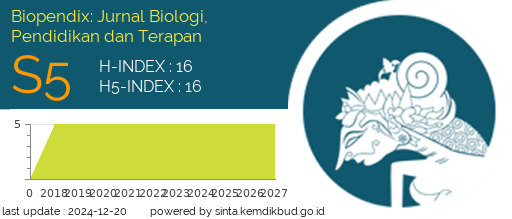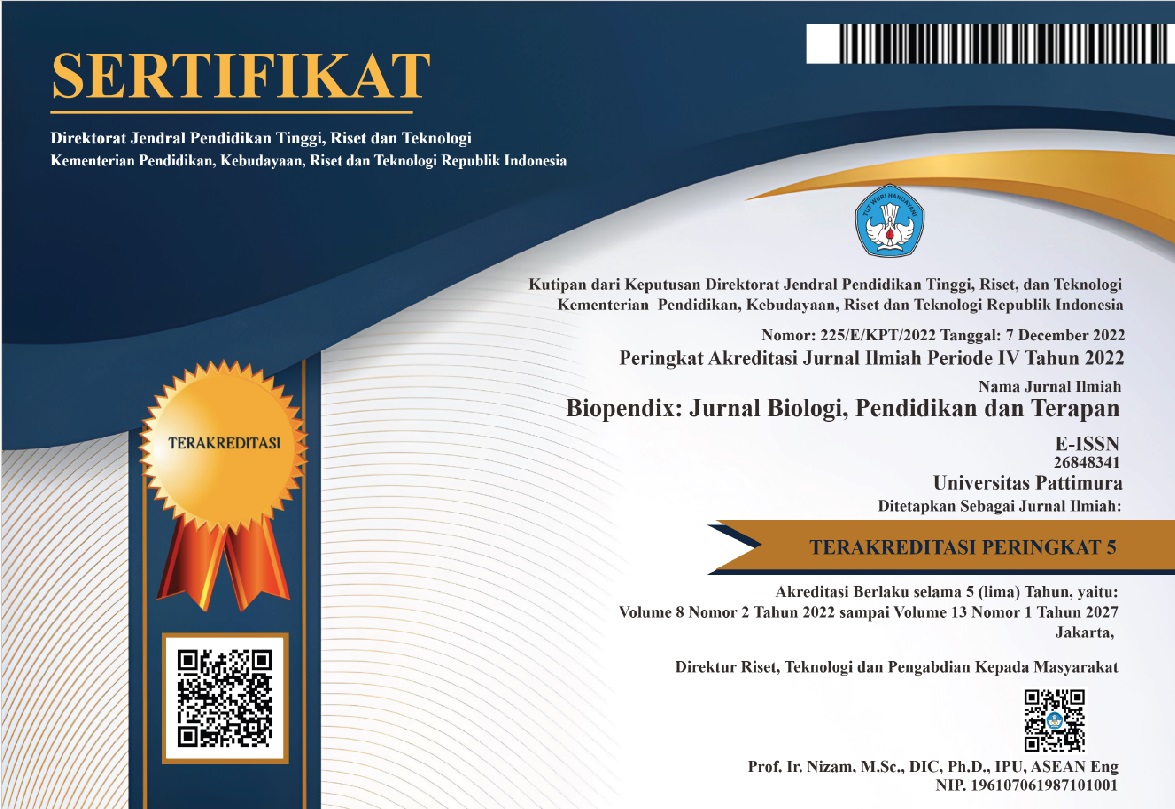PERBEDAAN HASIL BELAJAR SISWA MENGGUNAKAN MODEL PEMBELAJARAN KOOPERATIF TAI DAN STAD PADA MATERI GERAK TUMBUHAN PADA SISWA KELAS VIII SMP NEGERI 3 NAMROLE
Abstract
Background: The TAI (Team Assisted Individualization) model is individual assistance in the characteristic group that the responsibility is for students. Therefore students must build knowledge without accepting the finished form of the teacher. While the STAD Model (Student Team Achievement Division) is to motivate students to be able to support and help one another in mastering the abilities taught by the teacher.
Method: This research was conducted on April 10, 2017 - May 10, 2017 with the research location on Junior High School 3 Namrole. To find out the difference in learning outcomes, it was analyzed using T-test analysis.
Results: Through the design of quasi-experimental research shows that there are no differences in student learning outcomes taught using the TAI and STAD models, but in the TAI and STAD classes almost all students reach KKM 68. However, based on the calculation of the average (mean) and standard deviation for the class TAI 76.68 and class 75.31 so that it can be said that the TAI model is more effective than STAD.
Conclusion: There is an increase in student learning outcomes after conducting the teaching and learning process by using the Team Assisted Individualization and Student Team Achievemint Devision models so that the t-test results show that thit <ttab with thit 1.023 and ttab 2.0105.
Downloads
References
Endang Mulyatiningsih. (2012). Metode Penelitian Terapan Bidang Pendidikan. Bandung: Alfabeta
Murtadlo. 2005. Peningkatan Prestasi Belajar Siswa Berkesulitan Belajar Membaca Menulis Melalui Pendekatan Kooperatif Tipe TAI (Team Assisted Individualization) di SD: Jurnal Pndidikan Dasar, Vol. 6, No. 1, 2005.
Nur, M. 2003. Panduan Keterampilan Proses dan Hakekat Sains. Surabaya: University Press.
Suprijono, 2009. Model Pembelajaran Kooperatif. Depdiknas. Jakarta
Slavin, R. E. (2014). Cooperative Learning Teori, Riset dan Praktik. Bandung: Nusa Media.
Sudjana, 2004. Penelitian dan Penilaian Pendidikan. Bandung: Sinar Baru
Sukmadinata, 2004. Landasan Psikologi Pendidikan. Bandung: PT Remaja Roosdakarya
Trianyanto Ardi (2013). Studi Komparasi Metode Pembelajaran STAD dan TAI Dilengkapi LKS terhadap Prestasi Belajar Siswa Kelas XI pada MateriTermodinamika di SMA Negeri 8 Surakarta Tahun Pelajaran 2012/2013. Jurnal. Surakarta: UNS
Tuwankotta, 2010.Penggunaan Model Pembelajaran Poei Dalam Pencapaian Hasil belajar konsep Hewan Invetebrata Untuk Siswa Kelas X SMA PGRI 1 Ambon.Skripsi (Tidak dipubikasikan). Fakultas KIP: Universitas Pattimura.
Authors who publish with this Journal agree to the following terms:
- Author retain copyright and grant the journal right of first publication with the work simultaneously licensed under a creative commons attribution license that allow others to share the work within an acknowledgement of the work’s authorship and initial publication of this journal.
- Authors are able to enter into separate, additional contractual arrangement for the non-exclusive distribution of the journal’s published version of the work (e.g. acknowledgement of its initial publication in this journal).
- Authors are permitted and encouraged to post their work online (e.g. in institutional repositories or on their websites) prior to and during the submission process, as it can lead to productive exchanges, as well as earlier and greater citation of published works





 2
2






